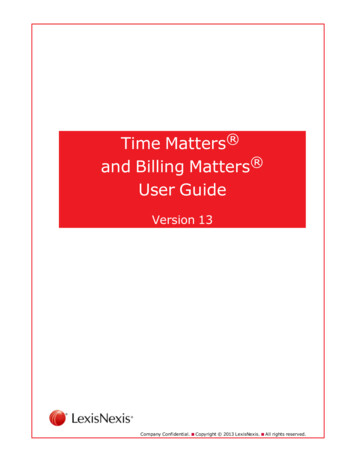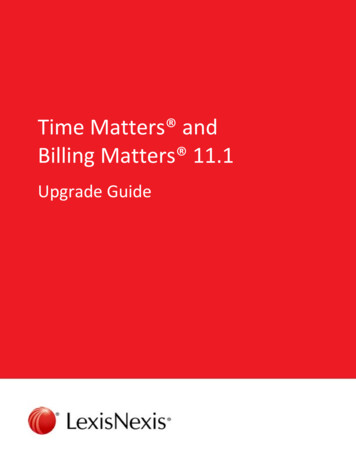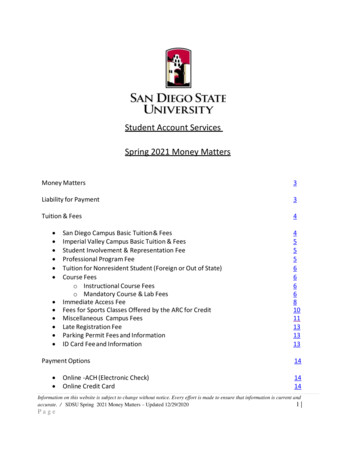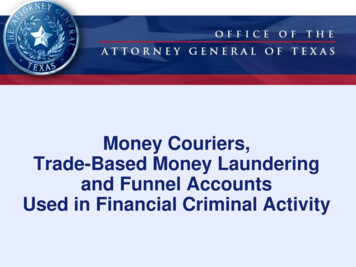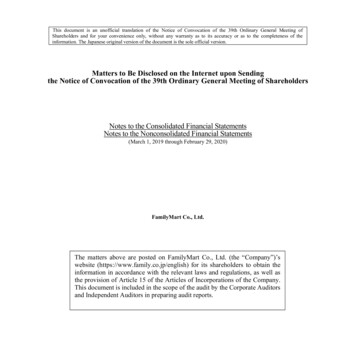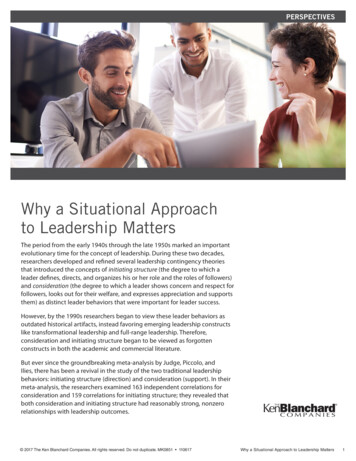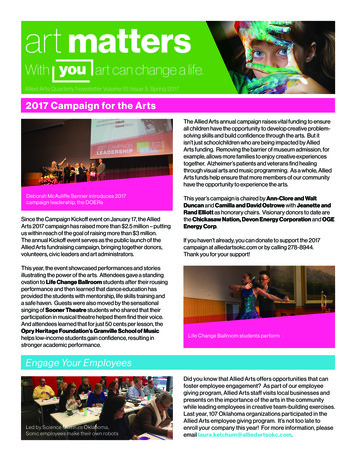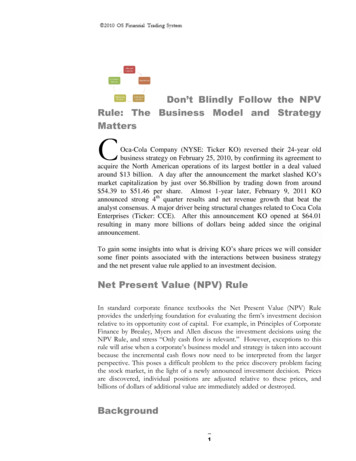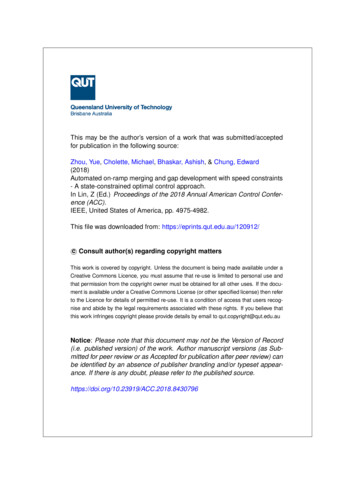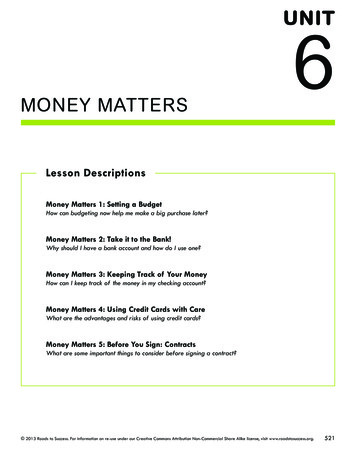
Transcription
UNITMONEY MATTERS6Lesson DescriptionsMoney Matters 1: Setting a BudgetHow can budgeting now help me make a big purchase later?Money Matters 2: Take it to the Bank!Why should I have a bank account and how do I use one?Money Matters 3: Keeping Track of Your MoneyHow can I keep track of the money in my checking account?Money Matters 4: Using Credit Cards with CareWhat are the advantages and risks of using credit cards?Money Matters 5: Before You Sign: ContractsWhat are some important things to consider before signing a contract? 2013 Roads to Success. For information on re-use under our Creative Commons Attribution Non-Commercial Share Alike license, visit www.roadstosuccess.org.521
PLANNING PYRAMIDGRADE 10, Unit 6, Money MattersSome Students Will: Use a budget as a guidewhen considering purchases.Most Students Will: Recognize the need for savings in case of an emergency. Given a weekly income, figure out net pay, set aside money forcollege, and create a budget for the remaining money. Identify things to consider when purchasing a cell phone plan. Understand that credit card companies charge fees for latepayments and interest if the balance isn’t paid in full each month. Understand that people with poor credit reports may have topay higher rates for credit cards, car loans, and mortgages. Use a check register to record deposits and checks. Identify credits, debits, and the account balance in an onlinebank statement.All Students Will: Recognize the need to plan ahead when saving money for college expenses.Understand that money charged to a credit card must be paid back.Understand the purpose of a check, and know how to write one.Understand the importance of knowing how much money you have in yourchecking account. Understand that a cell phone contract may contain hidden charges beyond theadvertised monthly price. Understand that potential employers and lenders have access to credit reports.522 2013 Roads to Success. For information on re-use under our Creative Commons Attribution Non-Commercial Share Alike license, visit www.roadstosuccess.org.
Grade 10Money MattersFamily NewsletterManaging MoneyRoads to Successis a new programdesigned to help middleand high schoolstudents prepare fortheir futures. Thisnewsletter will keepyou posted on whatwe’re doing in school,and how families canfollow through at home.For more informationabout Roads to Success,please visit our website:www.roadstosuccess.orgDid you know?An 8,000 credit carddebt, at a rate of 18%interest, will take over18 years to pay off andcost more than 27,000if you pay only theminimum amount of 125 each month.http://www.practicalmoneyskills.com(online calculator)A part-time job can giveyour child a new sense offinancial freedom. It maybe the first time that hehas his own money andchoices about how tospend it. This is a greattime to show him how tomake smart moneydecisions. Here aresome ideas about whereto begin:Budgeting Basics:Help your child develop abudget to save and spendwisely. Talk with her tofigure out what her biggoals are. If she wants tosave for a computer or forcollege, help her figure outa reasonable amount to setaside each week to reachher goal. While savingneeds to be a priority,some money should be leftover for fun.Keeping Track of YourMoney:Students interested inopening savings andchecking accounts will needto know how to keep trackof deposits and withdrawals.Show your child how youkeep track of thisinformation using savingspassbooks, check registers,or online banking.The Real Cost of Credit:Credit cards can be usefultools for managing money,but their misuse can causefinancial hardship. Explainhow credit cards work andwhat happens if a customerdoesn’t pay a bill on time.Let your child know thatfinance charges and latefees can cause consumersto spend a lot more onproducts than theyoriginally cost.Resources:For more information, checkout these websites: hildren/ www.practicalmoneyskills.comGrade by GradeIn 10th grade, students inRoads to Success participatein five real-life lessons onmanaging money. In thisunit students take on therole of a high school seniorpreparing for life aftergraduation. Here is whatthey will learn: Budgeting: Studentscalculate their take-homeincome from a summerjob, then create a budgetthat allows them to savefor college with money leftover for day-to-dayexpenses. Banking: Studentsexamine the differencebetween a savings and achecking account. Theypractice using a checkbookregister and analyzingonline bank statements.college graduates,students learn about theadvantages anddisadvantages of creditcards. Contracts: Studentsexamine cell phone plansto identify best values andhidden costs. Credit Cards: Afterexamining the dangers ofcredit card debt for recent 2013 Roads to Success. For information on re-use under our Creative Commons Attribution Non-Commercial Share Alike license, visit www.roadstosuccess.org. 2012 Roads to Success; All Rights Reserved.523
MONEY MATTERSSetting a Budget1The BIG Idea How can budgeting now help me make a big purchase later?AGENDAApprox. 45 minutesI.Warm Up: Imagine This.(5 minutes)II. Summer Income, Savings,and Expenses (15 minutes)III. Summer Budget: Does itAdd Up? (10 minutes)IV. Saving for the Unexpected(10 minutes)V. Wrap Up (5 minutes)MATERIALS STUDENT HANDBOOK PAGES: Student Handbook page 132,This Is Your Life Student Handbook page 133,Income Worksheet Student Handbook page 134,Weekly Expenses Worksheet FACILITATOR PAGES: Facilitator Resource 1, Chance Cards(one card for every two students) Facilitator Resource 2, IncomeWorksheet Answer Key Calculators (one per student) Overhead projectorOBJECTIVESDuring this lesson, the student(s) will: Based on a fictional scenario, determine how to set aside 1,000 for collegeexpenses in the fall. Determine their summer expenses, including what they will need to covertransportation, food, entertainment, and clothing. Develop and revise a budget based on their expected incomes and expenses. Modify their budgets to handle unexpected expenses. 2013 Roads to Success. For information on re-use under our Creative Commons Attribution Non-Commercial Share Alike license, visit www.roadstosuccess.org.525
Grade 10, Money Matters 1: Setting a BudgetOVERVIEW.In this lesson, students will begin a unit on Money Matters in which they’ll explore importantfinancial tools and concepts, like budgets, deductions, and bank accounts. Throughout thisunit, they will be following a fictional scenario in which they are high school seniors who havebeen accepted to college in the fall, and will be busy with a full-time job over the summer.In this lesson, they’re setting a summer budget that will allow them to put aside 1,000 forcollege expenses. They’ll determine their summer income, learn about the percentage of incomethat’s subtracted for taxes, and understand the difference between their gross and net incomes.Students will determine if their income will cover their summer expenses, such as transportation,food, and entertainment. Finally, they’ll be given a “chance card” with an unexpected expense,and consider why it’s important to set aside some extra savings when developing a budget.PREPARATION. List the day’s BIG IDEA and activities on the board. Write the day’s vocabulary words and definitions on the board. The following handouts need to be made into overhead transparencies or copiedonto chart paper: Student Handbook page 132, This Is Your Life Student Handbook page 133, Income Worksheet Student Handbook page 134, Weekly Expenses Worksheet Print out Facilitator Resource 1, Chance Cards and cut out the individual cards.Note: You will need to print this page twice to provide one card for each pairof students. For Activity I, Warm Up: Imagine This., write the following three questions on chartpaper before you teach this lesson.a. How much will I need to set aside for college each week?b. How will I spend the remaining money?c. How can I plan for unexpected expenses?526 2013 Roads to Success. For information on re-use under our Creative Commons Attribution Non-Commercial Share Alike license, visit www.roadstosuccess.org.
Grade 10, Money Matters 1: Setting a BudgetVOCABULARY.Budget: A plan that helps people track spending so they can get the things they needand want without running out of money.Income: The money you have coming in.Deductions: Money taken out of your income for taxes.Expenses: What you spend money on.Gross Income: The money you earn before taxes are taken out.Net Income: Your “take home” pay or paycheck amount; the money you earn aftertaxes are taken out.IMPLEMENTATION OPTIONS.In Activity III, Summer Budget: Does It Add Up?, students may need to see an example ofhow to make their budget. You may wish to model this for the class in the column marked“1st Try,” making sure to list expenses that total more than 96.In Activity IV, Saving For the Unexpected, you may change the scenarios to better fit yourstudents’ interests and costs in your area. 2013 Roads to Success. For information on re-use under our Creative Commons Attribution Non-Commercial Share Alike license, visit www.roadstosuccess.org.527
Grade 10, Money Matters 1: Setting a BudgetACTIVITY STEPS.I. Warm Up: Imagine This (5 minutes)1. SAY SOMETHING LIKE: Welcome, everybody. This is the first week of a new unitcalled “Money Matters.” In this unit, you’re going to learn all about money — how tokeep track of what you earn, how to save it, and how to spend it wisely. Throughoutthe unit, you’re going to take on a new persona. You’re going to imagine you’re notsophomores, but high school seniors. As seniors, you’ll have some important financialdecisions and plans to make, which you’ll be doing throughout this unit. For example:How can you plan a budget to save money for the future? How do you keep yourmoney safe and secure? How do you keep track of your money once it’s in the bank?What’s the best way to choose — and use — credit cards? If you decide to use yourmoney for a cell phone plan, how do you review a contract to make sure it’s in yourbest interest? As you answer these questions, you’ll learn about banks, checking andsavings accounts, ATMs and online banking, credit cards, and contracts.2. [Hand out copies of Student Handbook page 132, This is Your Life. Have avolunteer read this aloud to the class. Encourage students to listen closely, as they’llneed this information in the lesson:You’re a senior in high school. It’s March and you’ve been accepted tocollege. Your family has agreed to pay for some of the tuition, and you’reworking out a good financial aid package, too. However, you realize you’restill going to need about 1,000 a semester — or 2,000 total — to coversome important expenses, like books and daily living costs like laundry,school supplies, and an occasional pizza out with friends. You know that ifmoney gets tight, there are plenty of work opportunities on campus, but youreally want to have this money saved before you begin school.Lucky for you, you already have a great after-school job, and your boss haspromised you full-time work over the summer. You’ve figured out you cansave about 80 a week in your part-time job until school’s out. By the endof May, you’ll have put 1,000 aside for your college fund. That meansyou’ll need to save 1,000 during June, July, and August to make your goalof 2,000.]528 2013 Roads to Success. For information on re-use under our Creative Commons Attribution Non-Commercial Share Alike license, visit www.roadstosuccess.org.
Grade 10, Money Matters 1: Setting a Budget3. SAY SOMETHING LIKE: Any questions so far? OK, now it’s time to figure out yourbudget for the summer. (Display the following three questions on chart paper.)There are three questions you need to answer: How much will I need to set aside for college each week? How will I spend the remaining money? How can I plan for unexpected expenses?That’s the goal for today’s lesson.II. Summer Income, Savings, and Expenses (15 minutes)1. SAY SOMETHING LIKE: OK, we know we’ll have 1,000 saved from our after-schooljob, so we need to save 1,000 to meet our goal of 2,000 for our college fund. Ifwe’re working for 10 weeks over the summer, how much do we need to save each weekto save an additional 1,000? ( 100 a week)The next step is to figure out a weekly budget to see how we’re going to save thatmoney and cover our other summer expenses. What’s the next thing we need todetermine before we can figure out this budget? (Figure out how much we’re going tomake each week.) Let’s do this together. Please turn to your Student Handbook page133, Income Worksheet.[Project a transparency of Student Handbook page 133, Income Worksheet for theclass to see.]2. [As a class, review the details for the full-time job on the Income Worksheet. Thenwork together to calculate the “Weekly Gross Income.”]SAY SOMETHING LIKE: Now you might be thinking that every week, your paycheckwill be 290. But in reality, your gross weekly income is different from your take-homepay, or your paycheck, because money is deducted, or taken out, of every paycheckyou earn. These are called deductions. Does anyone know what deductions pay for?That’s right — taxes. The main taxes deducted from your paycheck are federal incometax, state and local income tax, and Social Security tax. Federal, state, and localincome taxes pay for things like roads, the military, schools, parks, and police and fireservices. Social Security tax helps pay benefits to people who are disabled or retired. 2013 Roads to Success. For information on re-use under our Creative Commons Attribution Non-Commercial Share Alike license, visit www.roadstosuccess.org.529
Grade 10, Money Matters 1: Setting a Budget3. SAY SOMETHING LIKE: On this worksheet, we’re estimating that about 30% isdeducted from your paycheck. However, this amount may vary, depending ondifferent factors like where you live, how much you make, and how many people arefinancially dependent on you, such as children.4. SAY SOMETHING LIKE: Let’s figure out your actual paycheck if 30% is deducted fortaxes. We determined that our gross weekly income, or the money you earn beforetaxes are taken out, is 290. Your taxes are based on your gross income.5. SAY SOMETHING LIKE: Now let’s figure out your deductions. If 30% is deducted fortaxes, you can calculate the deductions by multiplying your gross income by 30% or0.3. Use your calculators to see what the deductions would be.[On the transparency, write 87 next to line B, Deductions.]Note: If you aren’t earning a full-time, year-round salary, you may get some of thismoney back as a tax refund in the spring by filing an income tax return.6. SAY SOMETHING LIKE: So how much money will be in your paycheck? Subtract yourdeductions from the gross weekly income. What’s left is your net weekly income.Use your calculators to see what the net weekly income would be.[On the transparency, write 203 next to line C, Net Weekly Income.]Are you surprised at the difference between your salary and what you actually get totake home?7. SAY SOMETHING LIKE: Now let’s figure out how much of that paycheck we’ll haveleft over after we set some aside for our college fund. Remember, we need to save 1,000 over 10 weeks. So how much are we setting aside each week for our collegefund? ( 100 a week)[Write this on line D, “Weekly Savings for College Fund.”]8. SAY SOMETHING LIKE: How much is left over for other expenses — or maybe a littleextra savings?[Model how to subtract the Weekly Savings for College Fund (line D) from Net WeeklyIncome (line C), and write 103 on line E.]530 2013 Roads to Success. For information on re-use under our Creative Commons Attribution Non-Commercial Share Alike license, visit www.roadstosuccess.org.
Grade 10, Money Matters 1: Setting a BudgetIII. Summer Budget: Does It Add Up? (10 minutes)1. SAY SOMETHING LIKE: Will this be enough to cover our expenses? Let’s find out!Now I’d like you to turn to your Student Handbook page 134, Weekly ExpensesWorksheet. This is where you’ll figure out your weekly summer spending. Take amoment to think about how much you’ll need to spend each week in each category.Write the amount next to each category in the column “1st Try,” then total your weeklyspending. Look back at your net weekly income on your Income Worksheet. Will youhave enough to cover those expenses? (Are your total expenses less than 103?) Ifnot, try reworking your expenses in the next column under “2nd Try.”IV. Saving for the Unexpected (10 minutes)1. SAY SOMETHING LIKE: If you had money left over, who would spend it onsomething extra? [Show of hands.] Who would put it into savings? [Show of hands.]Why are savings important? [Allow students to respond. Then explain that savingshelp cover unexpected expenses, which are bound to happen to you no matter howcarefully you budget.]2. SAY SOMETHING LIKE: After all, just like you can’t predict what happens in life, youcan’t predict what expenses might pop up. I’d like each of you to partner with theperson sitting next to you. I’m going to hand each pair a “chance card” with one ofthese unexpected expenses. Don’t focus on what expense you were given or its cost.Instead, just think about how you can adjust your budget to cover this expense.3. [Hand out Facilitator Resource 1, Chance Cards, one to each pair.]4. SAY SOMETHING LIKE: If you don’t have a little extra savings, how will you handlethis expense?5. [Have partners discuss strategies for covering the extra expense, then share their ideaswith the group.]6. SAY SOMETHING LIKE: Suppose you had been setting aside 15 a week foremergencies. How many weeks would it take to save for this expense? Whatexpenses would you cut from your weekly budget to make this possible? 2013 Roads to Success. For information on re-use under our Creative Commons Attribution Non-Commercial Share Alike license, visit www.roadstosuccess.org.531
Grade 10, Money Matters 1: Setting a Budget7. [Have students use the third column on their Weekly Expenses Worksheet, “Saving forEmergencies,” to refigure their budgets, allowing 15 a week for savings.]V. Wrap Up (5 minutes)1. SAY SOMETHING LIKE: Who felt like you could handle your expenses, save for yourcollege fund, and put a little extra into savings for the unexpected?If you felt like you just couldn’t cover your expenses in real life, what are some thingsyou could do? (Cut back expenses, get another job — or a better-paying job)2. SAY SOMETHING LIKE: Why is it important to set a budget? Why does it help to seta goal when creating a budget? What if you decided to spend as much money as youwanted in the first part of the summer, then start saving later in the summer?3. SAY SOMETHING LIKE: This was a great start to our “Money Matters” unit. Nextweek, we’re going to talk about what to do with the money you’re saving for college.How do you keep it safe and secure over the summer? As you probably guessed, nextweek is all about choosing a bank account that’s right for you.532 2013 Roads to Success. For information on re-use under our Creative Commons Attribution Non-Commercial Share Alike license, visit www.roadstosuccess.org.
Grade 10, Money Matters 1: Setting a BudgetFacilitator Resource 1, Chance CardsChance CardsCongratulations, graduates!You and a few friends host agraduation cookout. But burgersand soft drinks aren’t free.Expense: 125Did someone say THEME PARK?Your friends are going on a daytripto a theme park on Satu
Credit Cards: After examining the dangers of credit card debt for recent college graduates, students learn about the advantages and disadvantages of credit cards. Contracts: Students examine cell phone plans to identify best values and hidden costs. Managing Money The Real Cost of Credit: Cred
